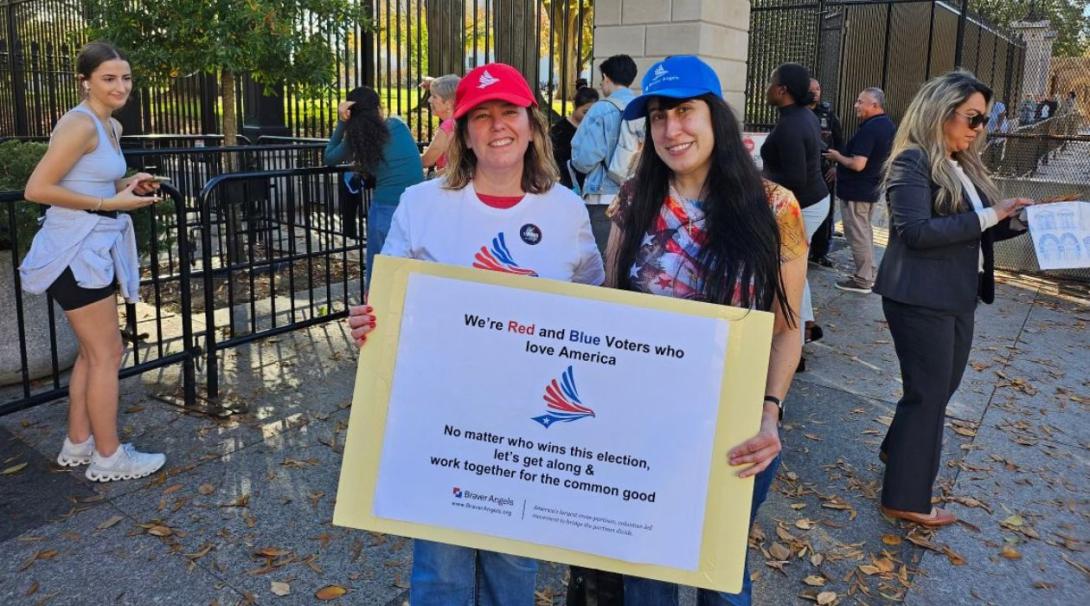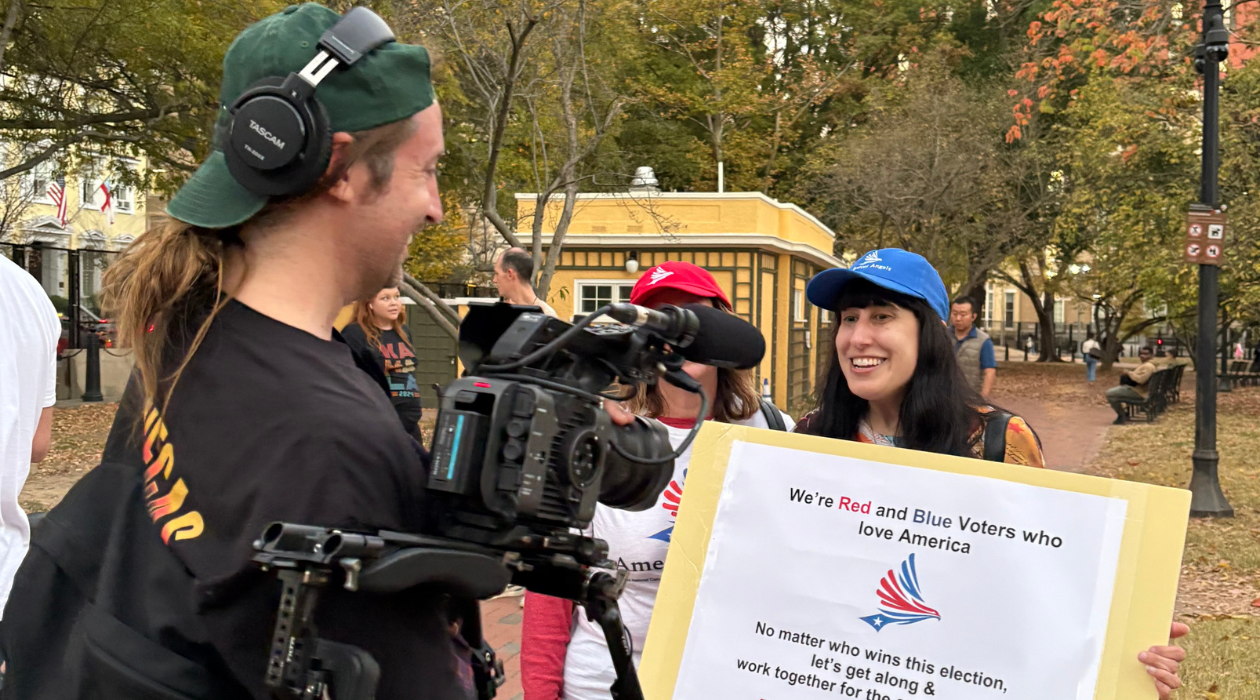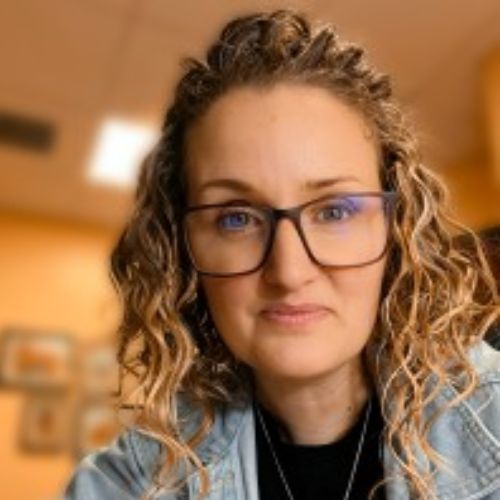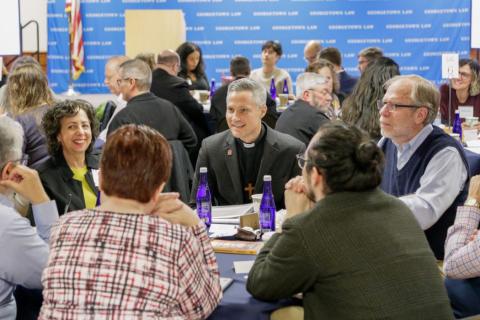
Rebecca Cataldi with her "voting partner" outside the Whilte House on election day for the “American Hope Campaign”
On Election Day 2024 a unique initiative brought together Americans from different political backgrounds in a show of unity. As part of their “American Hope Campaign” aimed at equipping Americans to work together across divides and demand the same of politicians, Braver Angels invited members to go to polling stations on November 5th in “Red” and “Blue” pairs as a sign that no matter who we were voting for, we can—and must—get along. Wearing red and blue baseball caps (depending on how they had leaned politically) pairs of voters stood outside polling places in nineteen states and the District of Columbia with signs that carried simple yet powerful messages such as:
-“We’re Red and Blue Voters committed to holding America together”
-“Vote Red, Vote Blue, We’re All Americans Through and Through”
-“Trump & Harris voters committed to getting along”
Two days later, I had the opportunity to chat with Rebecca Cataldi, the Braver Angels member who came up with this idea. Rebecca leans blue in her political views. She is a conflict resolution specialist at the International Center for Religion and Diplomacy and she dedicates a lot of her time outside of work to fostering unity in civic life as a volunteer with Braver Angels. With the election results stirring up a mix of emotions for many, I was curious about Rebecca’s perspective. How did she feel about the day’s events at the polling stations? How is she processing the outcome of the election?
Here are some highlights from our conversation that shed light on her experience and the spirit of the campaign.

Rebecca Cataldi with her "voting partner" being interviewed on election day for the “American Hope Campaign”
Is there anything you’d like to share about the origins of this initiative or how you came up with the idea?
While it wasn’t specifically designed as a faith-based initiative, the idea emerged from discussions within Braver Angels’ Faith Engagement leadership group. After I came up with the concept, I presented it to our group’s coordinator, who then brought it to the attention of Braver Angels’ national leadership. They were enthusiastic about it because they had been searching for a meaningful way for Braver Angels to engage on Election Day. As a result, it was adopted as a national initiative. Looking back, I can’t help but feel there was an element of divine inspiration in how it all came together.
What was your experience like on election day? Did you interact with passers-by?
Election Day was incredibly positive! My partner and I decided to stand outside the White House instead of a polling station, hoping for more visibility. We chose to be a quiet presence, not chanting or approaching people directly (which is typical for many groups who gather outside the White House). Many passersby gave us thumbs up, and some even came over to express appreciation for our message.
Lots of people, including international tourists from Brazil and India, asked to take pictures with us. One touching moment involved an Indian tourist joining us for a photo, wearing a white cap like a symbol of peace between my blue cap and my partner's red one.
We were interviewed by several media outlets, including some from Japan and Germany. A representative from the National Press Club also took our picture, saying she’d been hoping to see a message like ours all day. We spent four hours outside the White House and I felt uplifted, knowing we'd spread a positive message on what was for many an anxiety-inducing day. The experience even continued on our metro ride home, where we got more positive gestures including someone approaching us about sharing our message at a conference he is organizing. I was struck that people came to us voluntarily, drawn by our message. It confirmed that many Americans are eager for unity and peaceful disagreement.
Did you hear from others who took part in the initiative?
Yes, about fifteen of us gathered on Zoom the next night to share our experiences. Despite some initial logistical challenges, everyone reported overwhelmingly positive outcomes, both for the initiative and personally.
One blue-leaning participant shared a particularly moving insight. She was struggling with the election results but found comfort in her experience. During the day, she had engaged in conversations with Trump voters and heard their reasons for voting, which differed from her assumptions. She remarked, “I don't like or trust Trump, but I like and trust these voters and I'm developing friendships with them.”
This outcome was an unexpected but welcome surprise. While we initially aimed to impact passersby at polling stations with our message of unity, we discovered that the initiative profoundly affected us as participants too. It provided comfort, upliftment, and opportunities for relationship-building across political lines. I was thrilled to see how it became a source of personal growth and understanding for those involved.
I’d love to hear more about that. How did the experience influence your feelings while watching the results come in or on the day after, November 6th?
This election day experience was very important for me. I cannot deny that I experienced frustration with the results: when the person you supported doesn’t win, we can feel powerless and less represented in government going forward. But my day outside the White House gave me a sense of purpose and allowed me to contribute to the country I love, regardless of who won. I can say that the experience brought me comfort because, when I feel sadness about something, I like to respond by being useful or by doing something positive. Channeling my pain into motivation to do good allows me to feel like whatever caused me to suffer didn’t happen in vain, that something good came out of it.
The election initiative had that effect, providing me with an opportunity to contribute to a cause I believe in. I can even say that it responded directly to the sense of powerlessness that the defeat of my candidate gave because it reassured me that even in challenging times, I can make a difference and that my efforts can lead to something good.
Additionally, the overwhelmingly positive reception to our efforts reminded me how important it is not to make assumptions about why people vote one way or another, not to judge voters based on the most extreme voices that represent them in the media. The public’s positive response reaffirmed my hope in America and our ability to move forward together, regardless of the election outcome or the next four years. Seeing strangers respond positively to our message of unity reminded me that most people don’t want division. This gave me hope and a sense that we have something to work towards with our fellow citizens.
Lastly, hearing about the positive experiences the other participants had reinforced my belief that everything is in God's hands. God can use everything—even the things that seem totally unlikely to us—for additional positive outcomes we didn't anticipate. It was a beautiful reminder that ultimately, God is in charge, no matter what humans do, good or bad.
We spent four hours outside the White House and I felt uplifted, knowing we'd spread a positive message on what was for many an anxiety-inducing day.
I really appreciate how you underline that we cannot make assumptions about those who vote for the “other side,” in your case, Trump voters. Do you have personal experience with this over the past week?
Yes, I had a meaningful experience with this just after the election. A close family member, whom I deeply love and appreciate for his positive influence on my life, especially in my Catholic formation, reached out to check on me the day after the election. He’s a Republican who voted for Trump, primarily due to economic concerns and his stance on abortion.
I was touched by his gesture and shared that while I was sad about the outcome, I was genuinely glad he could feel happy about the results. His response surprised me—he clarified that he wasn’t happy, as he doesn't think highly of Trump despite voting for him.
This exchange reinforced in me the importance of not making assumptions about people's motivations for voting for a certain candidate, even when we strongly disagree with their choice. It showed me that the reasons behind someone's vote can be complex and nuanced; more often than not the reasons do not align perfectly with a candidate’s policy agenda or even with their feelings about the candidate.
Are there plans for a follow-up event?
We all agreed during our Zoom call that the positive response we received was so encouraging that we need to do this again. We want to expand our initiative beyond just Election Day to include other significant occasions, such as the Fourth of July, where we can promote depolarization and unity. We envision setting up our red-blue pairs not only at polling stations but also in parks or outside grocery stores.
Additionally, we’re considering organizing a larger-scale event, like a march in Washington DC, where people from across the country can come together to call for national unity. Naturally a large-scale event like this would need to be done with a lot of sensitivity; it would be essential for example that any speeches remain strictly nonpartisan, avoiding any digs at the opposing side. An event like this could be incredibly powerful, and I would be thrilled to see it happen.
***
It is clear that bridging divides is no small task, but as we reflect on the experiences shared through initiatives like the Braver Angels “American Hope Campaign,” I’m reminded that meaningful connections are possible even amidst disagreement. This message of hope and unity is just as (or arguably more) crucial in this post-election phase. As the nation processes the results, initiatives like this encourage us to engage constructively, and call us to remain rooted in hope. By embracing dialogue and understanding we can lay the groundwork for a more united future, turning our differences into opportunities for collaboration and building a resilient society together.













